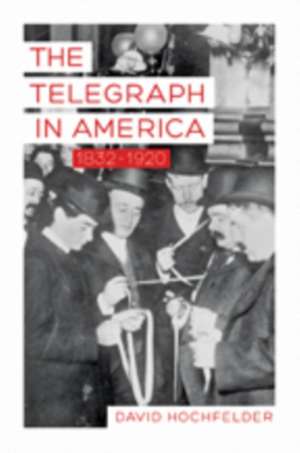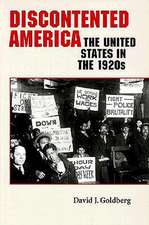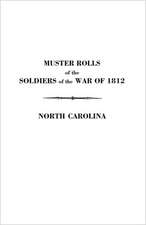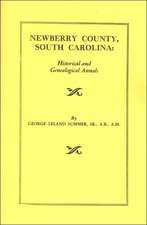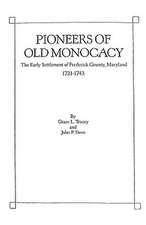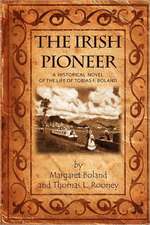The Telegraph in America 1832–1920: Johns Hopkins Studies in the History of Technology
Autor David Hochfelderen Limba Engleză Hardback – 17 ian 2013
Telegraphy in the nineteenth century approximated the internet in our own day. Historian and electrical engineer David Hochfelder offers readers a comprehensive history of this groundbreaking technology, which employs breaks in an electrical current to send code along miles of wire. The Telegraph in America, 1832-1920 examines the correlation between technological innovation and social change and shows how this transformative relationship helps us to understand and perhaps define modernity.
The telegraph revolutionized the spread of information--speeding personal messages, news of public events, and details of stock fluctuations. During the Civil War, telegraphed intelligence and high-level directives gave the Union war effort a critical advantage. Afterward, the telegraph helped build and break fortunes and, along with the railroad, altered the way Americans thought about time and space. With this book, Hochfelder supplies us with an introduction to the early stirrings of the information age.
Din seria Johns Hopkins Studies in the History of Technology
-
 Preț: 144.19 lei
Preț: 144.19 lei -
 Preț: 241.82 lei
Preț: 241.82 lei -
 Preț: 279.03 lei
Preț: 279.03 lei -
 Preț: 161.35 lei
Preț: 161.35 lei -
 Preț: 257.60 lei
Preț: 257.60 lei -
 Preț: 383.33 lei
Preț: 383.33 lei -
 Preț: 225.49 lei
Preț: 225.49 lei -
 Preț: 269.42 lei
Preț: 269.42 lei -
 Preț: 251.48 lei
Preț: 251.48 lei -
 Preț: 259.13 lei
Preț: 259.13 lei -
 Preț: 199.66 lei
Preț: 199.66 lei -
 Preț: 258.15 lei
Preț: 258.15 lei -
 Preț: 252.77 lei
Preț: 252.77 lei -
 Preț: 286.90 lei
Preț: 286.90 lei -
 Preț: 309.49 lei
Preț: 309.49 lei -
 Preț: 341.89 lei
Preț: 341.89 lei -
 Preț: 318.44 lei
Preț: 318.44 lei -
 Preț: 373.40 lei
Preț: 373.40 lei -
 Preț: 296.30 lei
Preț: 296.30 lei -
 Preț: 228.59 lei
Preț: 228.59 lei -
 Preț: 309.71 lei
Preț: 309.71 lei -
 Preț: 240.69 lei
Preț: 240.69 lei -
 Preț: 240.69 lei
Preț: 240.69 lei -
 Preț: 247.40 lei
Preț: 247.40 lei -
 Preț: 255.65 lei
Preț: 255.65 lei -
 Preț: 211.42 lei
Preț: 211.42 lei -
 Preț: 361.44 lei
Preț: 361.44 lei -
 Preț: 525.60 lei
Preț: 525.60 lei - 27%
 Preț: 326.97 lei
Preț: 326.97 lei - 21%
 Preț: 199.82 lei
Preț: 199.82 lei
Preț: 446.05 lei
Nou
Puncte Express: 669
Preț estimativ în valută:
85.35€ • 89.30$ • 70.90£
85.35€ • 89.30$ • 70.90£
Carte tipărită la comandă
Livrare economică 03-17 aprilie
Preluare comenzi: 021 569.72.76
Specificații
ISBN-13: 9781421407470
ISBN-10: 1421407477
Pagini: 264
Dimensiuni: 167 x 236 x 23 mm
Greutate: 0.48 kg
Editura: Johns Hopkins University Press
Seria Johns Hopkins Studies in the History of Technology
ISBN-10: 1421407477
Pagini: 264
Dimensiuni: 167 x 236 x 23 mm
Greutate: 0.48 kg
Editura: Johns Hopkins University Press
Seria Johns Hopkins Studies in the History of Technology
Textul de pe ultima copertă
Telegraphy in the nineteenth century approximated the internet in our own day. Historian and electrical engineer David Hochfelder offers readers a comprehensive history of this groundbreaking technology, which employs breaks in an electrical current to send code along miles of wire. The Telegraph in America, 1832-1920 examines the correlation between technological innovation and social change and shows how this transformative relationship helps us to understand and perhaps define modernity.
The telegraph revolutionized the spread of information--speeding personal messages, news of public events, and details of stock fluctuations. During the Civil War, telegraphed intelligence and high-level directives gave the Union war effort a critical advantage. Afterward, the telegraph helped build and break fortunes and, along with the railroad, altered the way Americans thought about time and space. With this book, Hochfelder supplies us with an introduction to the early stirrings of the information age.
"In The Telegraph in America, 1832-1920, David Hochfelder provides a taut and consistently intelligent history of the telegraph in American life. The book is notable for both its topical breadth--encompassing war, politics, business, journalism, and everyday life--as well as its focused, argument-driven chapters."--New Books in Communications
"The author... develops nuanced analyses to the impact of telegraphy upon American life."--EH.Net
"Hochfelder's work is exemplary in its caution about mediator technology-specific claims to exceptionalism or determinism. This authoritative and persuasive book will remain an essential reference for scholars."--American Historical Review
"For a quick assessment of telegraphy's development and impact, this insightful book is hard to beat."--Journalism & Mass Communication Quarterly
David Hochfelder is an associate professor of history at University at Albany, SUNY.
The telegraph revolutionized the spread of information--speeding personal messages, news of public events, and details of stock fluctuations. During the Civil War, telegraphed intelligence and high-level directives gave the Union war effort a critical advantage. Afterward, the telegraph helped build and break fortunes and, along with the railroad, altered the way Americans thought about time and space. With this book, Hochfelder supplies us with an introduction to the early stirrings of the information age.
"In The Telegraph in America, 1832-1920, David Hochfelder provides a taut and consistently intelligent history of the telegraph in American life. The book is notable for both its topical breadth--encompassing war, politics, business, journalism, and everyday life--as well as its focused, argument-driven chapters."--New Books in Communications
"The author... develops nuanced analyses to the impact of telegraphy upon American life."--EH.Net
"Hochfelder's work is exemplary in its caution about mediator technology-specific claims to exceptionalism or determinism. This authoritative and persuasive book will remain an essential reference for scholars."--American Historical Review
"For a quick assessment of telegraphy's development and impact, this insightful book is hard to beat."--Journalism & Mass Communication Quarterly
David Hochfelder is an associate professor of history at University at Albany, SUNY.
Descriere
With this book, Hochfelder supplies us with an introduction to the early stirrings of the information age.
